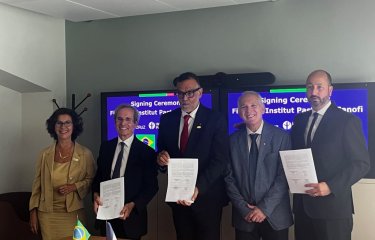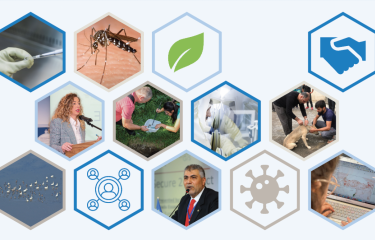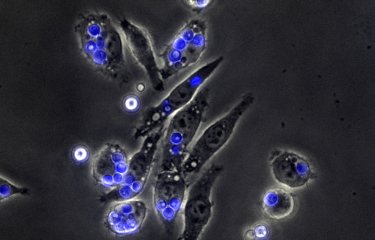The first mosquitoes carrying Wolbachia, bacteria that prevent them from transmitting arboviruses (including dengue, Zika and chikungunya), were released on Wednesday July 10, 2019 in Nouméa, New Caledonia, as part of the World Mosquito Program,* which involves teams from the Institut Pasteur de Nouvelle-Calédonie. The aim of this program is to encourage mosquitoes infected with Wolbachia to breed with wild mosquitoes, resulting in a population of Aedes aegypti mosquitoes that are unable to transmit arboviruses. To achieve this, scientists from the Institut Pasteur de Nouvelle-Calédonie progressively crossbred mosquitoes carrying Wolbachia with non-infected mosquitoes so that the bacteria are transmitted to future generations.
The first Aedes aegypti mosquitoes infected with Wolbachia bacteria were released at a ceremony held in Nouméa city center.
The presence of Wolbachia in the mosquitoes prevents any arboviruses they carry from multiplying. The infected mosquitoes pass the bacteria on to future generations.
Scientists from the Institut Pasteur de Nouvelle-Calédonie** are part of the World Mosquito Program consortium, in partnership with Monash University, the City of Nouméa and the Directorate of Health and Social Affairs (DASS) in New Caledonia.
The scientists infected mosquitoes with Wolbachia and checked that this prevented various arboviruses from multiplying. They also carried out tests to verify the mosquitoes' fecundity, fertility and longevity so as to make sure they would become established in Nouméa. A series of 230 traps have been set up throughout the city to enable the scientists to check whether the bacteria are spreading throughout the mosquito population.
Mosquitoes carrying Wolbachia will be released every week for 6 months at 3,500 points in Nouméa, and the scientists will regularly check the traps to monitor the spread of the bacteria among the mosquito population.
This "biological control" method raises real hopes, alongside other methods to tackle mosquito breeding grounds. Australia was a pioneer in this field following almost 20 years of research. The method is recommended by the World Health Organization (WHO).
Find out more:
See a video showing the mosquito release and an interview with Dr. Nadège Rossi, leader of the Wolbachia project in New Caledonia (Source: Les nouvelles calédoniennes, in French):
* The consortium is composed of the City of Nouméa, the Government of New Caledonia represented by the DASS, Monash University in Australia and the Institut Pasteur de Nouvelle-Calédonie.
** Scientists from the Dengue and Arboviruses Unit, directed by Myrielle Dupont Rouzeyrol, and the Medical Entomology Unit, directed by Nicolas Pocquet.





